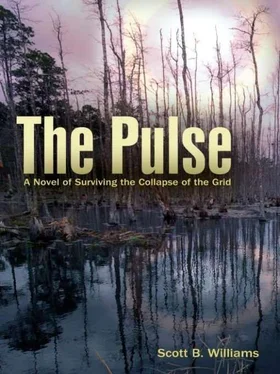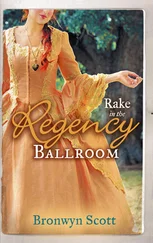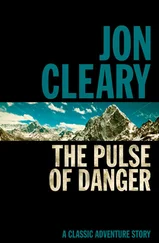“What do we do, walk along the banks pushing the bikes or something?” Casey asked.
“No, that would be impossible. You couldn’t walk the banks at all, much less with a bicycle. It’s too swampy and the undergrowth is far too dense. It’s almost like a jungle, in fact, and you’d need a machete to go a hundred yards. It would take days to walk it and in places you’d have to wade or swim across sloughs and side creeks. Nope, we can’t walk it, we’ve got to go by canoe, that’s the only way.”
“But where are we supposed to get a canoe?”
“I’m not a hundred percent certain, but I think I have a pretty good idea. But first we have to keep going north just a few more miles. Then we’ll turn back west on the last road that crosses the river on the Louisiana side of the state line.”
They continued riding on Highway 25 into an increasingly rural setting, where large pine plantations and other wooded areas outnumbered pastures and clearings. The turn-off to the west that Grant wanted to take was less than a mile south of where 25 crossed the state line and became Mississippi State Highway 27. In the flat, wooded terrain, though, it was impossible to see that far, so despite their curiosity about the roadblock, Grant led them west onto Highway 438, the northernmost east-west road in Louisiana to bridge the Bogue Chitto, and the closest river access to the cabin on this side of the state line.
It was only a short ride on 438 to the river from the turnoff, and when they reached the east end of the bridge, Grant pulled over on the wide gravel shoulder and dismounted. There was a deeply rutted dirt and gravel access lane leading down the steep bank and curving out of sight under the bridge. The river was wide here, flanked by heavy woods on either side, and swollen above normal levels by the rain of the past two days, its current running strong, especially in midstream.
“Let’s push our bikes down the bank and get them out of sight of the road, in case someone comes along.”
“Wow, this river is bigger than I thought,” Casey said. “From the way you described it, I thought it was more of a creek.”
“It is, normally. The rain’s got it up. It rises fast in rains like this, but goes down fast too. It looks like the rain is about over now, and if it is, the river will be back to normal in a couple of days or so. It’s a lot nicer when it’s lower. The sandbars in this stretch are normally a lot wider, but you can’t see all of them because they are partially underwater right now.”
“How could anybody paddle a canoe upstream against that?” Jessica asked. She had never been canoeing, but remembered how hard it was to paddle against the wind when she and Casey were out playing on Larry’s kayak during their island vacation the summer before.
“You can’t go against the main current,” Grant said. “But you can play the eddies close to the bank, get out and pull it in some shallow places, and use a pole to push off the bottom in others. It’s doable, you’ll see.”
“But I still don’t see any canoes, Grant,” Casey said. “Where do you plan to get one?”
“Downstream. There’s a camp not too far up below the bridge on this side of the river. I remember seeing it last time I paddled this stretch from our cabin and we took out down in Franklinton. There must be a private road leading to it from somewhere off of Highway 25, I’m not sure, but it’s one of those really nice weekend getaway camps, not a full-time residence. Probably owned by someone in New Orleans or Baton Rouge. I remember seeing a separate boathouse up on the high bank next to it, with a whole rack of canoes in it. I seriously doubt whoever owns that camp was able to get here after the lights went out. It’s probably vacant unless someone local is using it.”
“You’re not thinking of stealing a canoe, are you?”
“Not stealing—buying. I wouldn’t do it if they just had one, but there must have been at least six in that boathouse. I figure our three bikes are worth a lot more than one canoe, and besides, after all this is over we can bring it back and maybe even get our bikes back. But we sure don’t need them as bad as we need a canoe right now.”
“How will you ask them to trade if no one’s home?” Jessica asked.
“I don’t plan to ask, and I’m counting on the odds that no one will be home. We can’t get these bikes through all the undergrowth downstream to the camp anyway. I figure we can hide them somewhere partway up there and leave a note for the owners of the canoe, telling them where to find them, and explaining what we did.”
“Isn’t that still stealing, in a way?” Casey asked.
“It’s survival, Casey. If we don’t find a way to get to my cabin soon, we’re going to be out of food and in real trouble. Do you have a better idea?”
“No, I guess not. I just don’t want to get in trouble, and I don’t want to get shot by somebody for trespassing and stealing from them.”
“We’ll be extremely careful. Here’s what I had in mind. I’ll need one of you to go with me to help me carry the canoe down the bank and paddle it back up to here. Someone needs to stay behind with the bikes and our gear just in case we can’t get a canoe and still need them. Casey, I think that should be you, since you know how to use your dad’s pistol. I’ll leave it with you and take Jessica with me to get the canoe.”
“Shouldn’t we all just go look for it?” Jessica asked. “Can’t we just hide the bikes and our other stuff?”
“We’ll hide everything, but I’ll still feel better if one of us is with it. It shouldn’t take more than an hour to get there and get back with the canoe, assuming we can find paddles, which should be stored in the boathouse too. We’ve got to be quiet. If we all go, it will be harder to sneak up to the cabin, just on the off chance someone is home.”
“I’ll stay,” Casey said, “but in case someone is there, don’t you need to take the gun with you?”
“No, I hardly want to get into a gunfight with the owner. If anyone’s around, we’ll forget the whole thing. But I don’t want you staying here alone near the bridge unarmed. Someone could come down to the river at any time. Let’s get the bikes out of sight, and all you have to do is sit tight and wait. We’ll be as quick as possible.”
When they had rolled the bikes into a patch of tall river cane where they could not be seen from the bridge or the dirt lane leading under it, Grant set out, picking his way through the woods downstream, with Jessica following him. He carried his machete, but didn’t want to make noise by cutting vines and brush out of their path, so they had to weave their way through the worst of the undergrowth. The rain had turned all areas of the bank that were not sand into mud, making the walking difficult, but because everything was so wet, they were able to move quietly without the worry of crackling leaves or snapping twigs.
Grant was beginning to wonder if his memory was playing tricks on them by the time they had worked their way maybe a half mile down the river. Then they came to a clearing in the riverside forest, and carefully approaching the edge while staying in the cover of the trees, he saw that it was the camp he remembered. The cabin, which was as big as many regular houses, was situated on a clay bluff that overlooked the river from maybe 20 feet up. He could see the boathouse on the other side of it. It would be too risky to simply walk out across the open yard to it, as they would have to walk right past the front of the house to reach the canoes and it was impossible to tell if anyone was home or not. He whispered to Jessica and she followed him as he began to circle the property, staying out of sight within the edge of the woods as they worked their way all the way around to the other side to the boathouse.
Читать дальше












